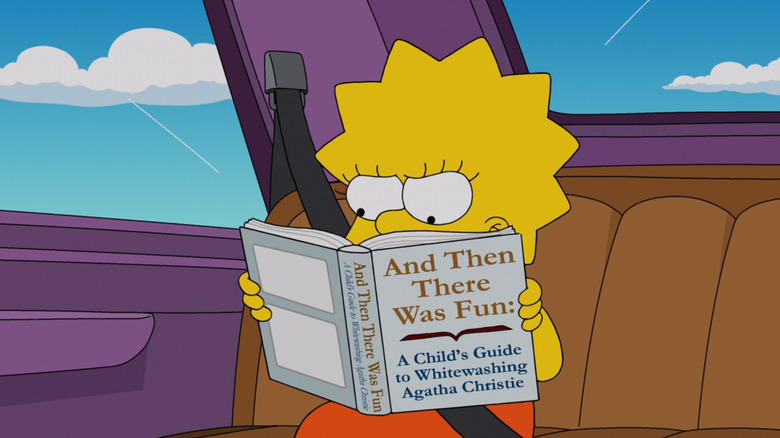The Only Agatha Christie Novels Never To Get Any Kind Of Adaptation
Agatha Christie wrote 66 novels throughout her career, and not all of them were bangers. For every classic like "Murder on the Orient Express" — which has received countless movie adaptations over the years — there's a book like "Hallowe'en Party," which was only adapted recently in 2023, over 50 years after its publication date (and with a different title, no less). There were even some Christie novels that have never received a movie adaptation at all, like her 1935 plane-based mystery "Death in the Clouds" that was only ever given the TV miniseries treatment.
At the bottom of most Christie fans' to-read list are four books of hers that never received an adaptation of any kind, be it as a movie, TV show, radio play, or graphic novel. Her 1944 book "Death Comes as the End," her 1954 book "Destination Unknown," her 1970 book "Passenger to Frankfurt," and her 1973 book "Postern of Fate" have all been ignored by the entertainment industry. So, what was wrong with them?
'Destination Unknown' and 'Passenger to Frankfurt' are not detective novels
For "Destination Unknown" and "Passenger to Frankfurt," one explanation for their lack of adaptations is that they strayed from the usual mystery format Christie was known for. Although one can hardly blame Christie for trying out a new genre every now and again, critics at the time (and critics today) generally agree that detective fiction was her strong suit. Spy novels weren't.
Of these two books, the earlier "Destination Unknown" had the stronger critical response. "It is a thriller, proving that the author really improves with age," one critic wrote at the time. "It is told with all the familiar Christie skill, and there is everything from a mass cremation to leper colonies and plastic surgery." The book was published serially, released a chapter at a time first for the British magazine John Bull and then in the Chicago Tribune in the U.S. Although the general consensus on the book stayed positive, the praise died down a bit as the story went on, and some of its final-act twists strained readers' credulity.
"Passenger to Frankfurt," published much later in Christie's career, received far more mixed reviews. "Miss Christie displays an annoying failure to tie up some of the loose ends in her narrative," one critic wrote, although they added, "For all that, the book fascinates, and the reader is carried along by the sheer momentum of the prose." Christie was 80 years old at the time it was published, and the general consensus was that her best writing years were long behind her.
'Death Comes as the End' and 'Postern of Fate' have been ignored for very different reasons
"Death Comes as the End" was both a detective story and a historical fiction novel, and it received strong critical acclaim in its time. Even today, it's still well-liked among hardcore Christie fans, which makes it even weirder that there's never been an adaptation. BBC was in talks to make a TV miniseries adaptation in 2019, but the project never took off.
Fans have speculated on the lack of adaptation for this book, and the main theory is that the entertainment industry hesitated because the characters are all Egyptian. The cast would be filled with people of color, a stark departure from the white, European casts of most of Christie's works. The other issue for Hollywood was the costs associated with filming a period piece in Egypt, as well as the book's lack of any already-famous characters like Poirot or Miss Marple.
"Postern of Fate," meanwhile, was Christie's last novel before her death. Even more so than "Passenger to Frankfurt," the declining quality of the prose and plot here is largely attributed to her old age. "I wish I could report that 'Postern of Fate' was one of her better efforts, but the truth is that it lacks drama, movement, and mystification. Perhaps the old lady is slowing down," one critic remarked. There's no mystery here for why "Postern of Fate" never got an adaptation; a faithful one wouldn't be worth watching.
The case for adapting every Christie novel, even the bad ones
Although it makes sense that books like "Passenger to Frankfurt" or "Postern of Fate" aren't on the top of any studio exec's lists, I'd argue there's a great recent Christie adaptation that makes a strong case in their favor. That adaptation was "A Haunting in Venice," the 2023 Kenneth Branagh adaptation of "Hallowe'en Party." Bringing in Tina Fey and Michelle Yeoh for a spooky mystery in post-WWII Venice, this movie was easily the best of the three Poirot movies Branagh's made so far. You'd think Branagh's 2017 adaptation of "Murder on the Orient Express" would be the better film, but no: "A Haunting in Venice" was when screenwriter Michael Green locked in and gave us a genuinely riveting, emotionally rich Poirot mystery.
The reason this movie was so good was that its source material wasn't. "Hallowe'en Party" is ranked low on the list of Christie fans' favorite novels, thanks to its paper-thin cast of characters, its anti-climactic resolution, and its repetitive, clumsy social commentary. This was a book so weak that few fans would complain about any adaptive changes the movie's screenwriters might pull, which means that "A Haunting in Venice" was allowed to change pretty much everything. The setting, the tone, the themes, the motivations for the killer, the order of deaths... even if you've read the book ahead of time, the movie has a ton of surprises in store.
This is the benefit of adapting one of Christie's lesser novels: it gives the screenwriters full freedom to take whatever worked about the book and disregard everything that didn't. They'd be allowed to go crazy and throw extra twists into the story in a way they simply can't with another adaptation of "And Then There Were None" or "Murder on the Orient Express." These four books may be old at this point, but they offer Hollywood the chance to give viewers something new.



